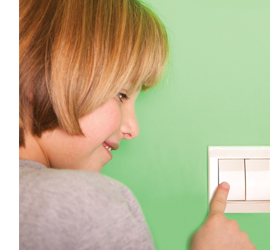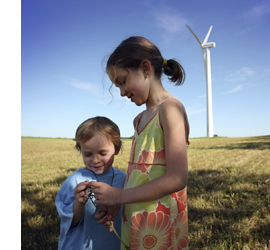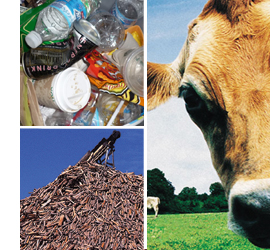
Connect with us.
Fall 2014 newsletter
Leaks from natural gas pipelines, although rare, can be a hazard. Whether in your home, your school, in a building or outdoors, it’s important that you’re able to recognize a gas leak and know what to do if one occurs. By taking the proper precautions, you can help avoid a serious situation. Remember, it’s better to be safe than sorry. When it comes to natural gas safety, remember the 3 R's: Recognize | React | Report 1. Recognize These are the more common signs of a natural gas leak:
2. React If you suspect a natural gas leak, follow these steps:
3. Report It is important that you call the local utility about a natural gas emergency. Do not text or e-mail.
You can call any time of day or night, seven days a week. Since the situation could be dangerous, utilities respond promptly—and there is no charge for this service.
There are two sides to energy efficiency Energy efficiency has been a hot topic for quite a while and there are several reasons why. First of all, saving energy lowers your family’s monthly utility bill. By using less gas, oil and electricity, we can save a great deal of money. With the cost of fuel going up, it’s becoming more and more important to use energy wisely. In addition, energy efficiency helps us maintain a healthier, cleaner environment. Saving energy at home There are many ways to save energy at home. Using appliances and electronic devices that are designed to use less electricity is one way. Replacing old heating and air conditioning systems with newer, more efficient models is another way. Energy-efficient appliances and systems are usually more expensive, but many of them save so much energy that the savings pay for the added cost in just a few years. We can also save energy by turning off lights, appliances and electronic devices when they’re not being used. A ceiling fan uses much less electricity than an air conditioner. So, on days when it’s not really that hot, we can conserve energy by using the fan.
Sustaining a clean environment There is a much bigger picture, too. We can help the environment by practicing energy efficiency. If we’re more efficient with our heating systems and energy use, we produce less pollution and have cleaner air to breathe. It’s important that we plan ahead now, use energy wisely, thereby reducing our impact on the environment and preserving energy resources for the future. Power plants, which produce our electricity, also use fuel to run generators. By using less electricity, we reduce the amount of fuel that power plants need for their generators. Conserving natural resources There is a limited supply of gas, oil and other fossil fuels. By being energy-efficient, we can make these valuable resources last longer. Each person and each home that practices energy efficiency can add up to make a big difference. Additionally, students, teachers and parents can reach out to utilities in order to find out more about energy efficiency—including exploring this website! In the end, energy efficiency saves us money and resource,s and makes for a healthier, cleaner environment.
Biomass is a type of renewable energy that is not as well known as solar power, wind energy or hydropower. It’s a little more complicated, too, but biomass energy has been in use for many years. You might be surprised to learn that, until recently, biomass produced more energy than solar and wind combined. Biomass is fuel that is produced from organic, or natural, materials and is used to create electricity and other forms of power. Biomass can produce electricity, heat and fuel from rotting plants and animal waste. As these things are decaying, they create methane gas, which can be turned into fuel for vehicles and farm equipment. Methane can also be used as fuel for power plants to generate electricity. Garbage is dumped into landfills, which are a good source for methane gas. When the garbage decomposes, methane is produced. By using special pipelines installed in the landfills, the methane gas can be collected. The gas can then be stored in tanks and shipped to power plants to make electricity. This type of biomass fuel is called landfill gas. Farms are another good source of methane. In fields where cows, cattle and horses graze, the animal droppings, or manure, can be picked up and stored. When this animal waste decays, it gives off methane gas, just like the rotting garbage in the landfill. The methane gas can be used on the farm to produce heat and electricity. If there is a surplus of methane, it can be shipped to other places where it can be used. Wood waste, which is plentiful at lumber plants and farms, is one of the largest sources of biomass. The wood waste is loaded into big trucks and driven to a biomass plant, where it is burned in furnaces that boil water for steam turbines. These steam turbines power generators that produce electricity. Because it recycles natural materials that would otherwise be shipped off to landfills, biomass energy is renewable energy. We are constantly replacing the sources for biomass energy by planting new crops, collecting animal manure, and processing wood, which produces organic waste. By dumping less waste materials into landfills, we save the energy needed to haul and process the trash. This is good for the environmen,t because less waste means less energy used. Biomass helps us in two ways: It reduces trash and creates clean, renewable energy at the same time.
What is a mentor? The dictionary defines mentor as “a wise and trusted counselor or teacher.” A mentor can be other things, too, such as an adviser, a tutor, a coach or an expert in an area where you have interest. Although it’s always good to try and figure out things on your own, it can also be helpful to have someone provide answers to difficult questions and steer you in the right direction. There’s another big advantage to mentoring: It can be a great experience. In addition to the satisfaction of helping others, mentors often learn new things themselves. Being a good mentor goes beyond simply knowing a lot about a particular subject. You also need to organize yourself so you can explain things clearly. You have to be able to get along well with the person you’re mentoring. It’s also very important to encourage, motivate, and find ways to offer constructive criticism. Mentoring is not just one person telling another person how to do something correctly. It’s working together as a team to accomplish a goal. It takes time to become a good mentor, but in the process, you can learn many essential social skills—and you’ll probably learn some interesting things about yourself. You don’t have to be an adult to be a mentor. Teenagers often make great mentors, because younger students can relate to them. Older students can provide valuable help by tutoring younger kids in math and other subjects. They can also help them learn about music, acting, art and sports. If there’s a subject or area in which you’re really good and really like, you’ll probably make an excellent mentor. Another great way to learn about mentoring is to help a more experienced mentor. If you’re a good baseball player and love the game, why not serve as an assistant coach for a youth team? Or if you like acting, maybe you can assist the drama teacher in producing a play for younger students. There are many other opportunities for mentoring at school and in the community. It can be a fun, and very rewarding, experience for you and the people with whom you’re working. |
Explore our world of energy education.
Visit www.ngridenergyworld.com.
 The 3 R's of natural gas safety
The 3 R's of natural gas safety
 During the winter, if we turn the thermostat down just a little, it can save energy. What’s more, opening curtains during the day to let in the sun and closing them at night to keep out drafts can also help save energy. And the more we save, the lower our utility bills are.
During the winter, if we turn the thermostat down just a little, it can save energy. What’s more, opening curtains during the day to let in the sun and closing them at night to keep out drafts can also help save energy. And the more we save, the lower our utility bills are. Growing energy though biomass
Growing energy though biomass Mentoring can be a great experience for everyone involved
Mentoring can be a great experience for everyone involved